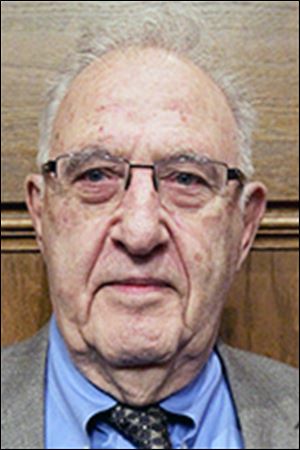
COMMENTARY
Bobby Kaplan makes closing arguments for the law
4/22/2014

“All these interesting characters you find to write about in Toledo. ... It makes me want to meet them.”

Kaplan
So said Robert Z. “Bobby” Kaplan, the most interesting character of them all.
Mr. Kaplan is a raconteur, an unapologetic bleeding heart, and a local lion. For years, he was this city’s leading criminal attorney. Now he has cut back. But he still goes to his office every day — “my favorite place to be.”
He works for CASA — the noblest of all child advocacy groups — and other just causes. And just as he did when he was defending Black Panthers, he makes time for “small” cases that make big differences in people’s lives. Mr. Kaplan’s son Sam shared with me an essay from The Chicago Lawyer by a man who became an attorney because of Bobby Kaplan. The man, Josh Vincent, told the story of his mother — a single mother who hit a bad patch of luck when Mr. Vincent was growing up. His mother made $5 an hour and was in a serious car accident without insurance.
Then her son, Josh, got in a fight at school and she was sued. Mr. Vincent wrote that Mr. Kaplan rescued his mother, indeed their whole family. He made their legal problems go away. Yet, years later, Mr. Vincent found a letter from Mr. Kaplan to his mother that read: “There will be no fees for legal services rendered in this matter, as they were minor services and you are a major client.”
Mr. Vincent wrote that the greatest satisfaction he has found as a lawyer is pro bono work and that he uses that same Kaplan one-liner today.
For a half-century, Bobby Kaplan has devoted himself to the law the way a great musician devotes himself to music. The law is his vocation, his obsession, and his muse. I hope young lawyers look to him, for he has things to say about criminal law that violate accepted wisdom and pop culture.
For instance, he says lawyers don’t matter all that much in a criminal trial. It’s the evidence, the judge, and the judge’s instruction to the jury that matter. The closing arguments only win a trial on TV. Lawyers have leeway here because a summation can’t overcome evidence or juridical instruction. Mr. Kaplan is also a believer in juries. Usually, he says, they follow the law.
Out of English jurisprudence, he told me, comes a brilliant and necessary fiction: the presumption of innocence. “No one believes that for a second.” We all tend to presume guilt. The presumption of innocence, Mr. Kaplan says, balances a basic human tilt toward unfairness.
So too the standard of guilt “beyond a reasonable doubt.” It balances our natural tendency to believe the worst. The legal system is not about a search for truth, which is a philosophical, and occasionally journalistic, pursuit. Rather, Mr. Kaplan said, the law is a competition of interests and rights and a balancing of legal weights and measures.
Toledo has a Dickensian cast of rich and interesting characters. But I think Bobby Kaplan is my favorite.
I know a man who is an Australian barrister, and also called to the criminal bar. They made a TV show about him. But no one could make a TV show about Bobby because there is no actor who could play him. Brando and Barrymore are dead.
Keith C. Burris is a columnist for The Blade.
Contact him at: kburris@theblade.com or 419-724-6266.